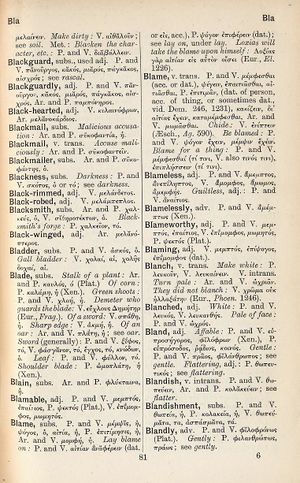blame: Difference between revisions
Ἡ βουλὴ καὶ ὁ δῆμος ἐτίμησεν... → The Council and the People honored... (inscription in the Roman city of Aizonai)
mNo edit summary |
m (Woodhouse1 replacement) |
||
| Line 1: | Line 1: | ||
{{Woodhouse1 | {{Woodhouse1 | ||
|Text=[[File:woodhouse_81.jpg|thumb|link={{filepath:woodhouse_81.jpg}}]] | |Text=[[File:woodhouse_81.jpg|thumb|link={{filepath:woodhouse_81.jpg}}]] | ||
===substantive=== | |||
P. and V. [[μέμψις]], ἡ, [[ψόγος]], ὁ, [[αἰτία]], ἡ, P. [[ἐπιτίμησις]], ἡ, Ar. and V. [[μομφή]], ἡ. | [[prose|P.]] and [[verse|V.]] [[μέμψις]], ἡ, [[ψόγος]], ὁ, [[αἰτία]], ἡ, [[prose|P.]] [[ἐπιτίμησις]], ἡ, [[Aristophanes|Ar.]] and [[verse|V.]] [[μομφή]], ἡ. | ||
[[lay blame on]]: P. and V. αἰτίαν ἀναφέρειν (dat. or εἰς, acc.), P. ψόγον ἐπιφέρειν (dat.); see [[lay on]], under [[lay]]. | [[lay blame on]]: [[prose|P.]] and [[verse|V.]] [[αἰτίαν ἀναφέρειν]] (dat. or εἰς, acc.), [[prose|P.]] [[ψόγον ἐπιφέρειν]] (dat.); see [[lay on]], under [[lay]]. | ||
[[Loxias will take the blame upon himself]]: [[Λοξίας | [[Loxias will take the blame upon himself]]: [[Λοξίας γὰρ αἰτίαν εἰς αὑτὸν οἴσει]] ([[Euripides|Eur.]], ''[[Electra]]'' 1226). | ||
===verb transitive=== | |||
P. and V. μέμφεσθαι (acc. or dat.), ψέγειν, ἐπαιτιᾶσθαι, αἰτιᾶσθαι, P. ἐπιτιμᾶν, (dat. of person, acc. of thing, or sometimes dat., vid. Dem. 246, 1231), κακίζειν, | [[prose|P.]] and [[verse|V.]] [[μέμφεσθαι]]; (acc. or dat.), [[ψέγειν]], [[ἐπαιτιᾶσθαι]], [[αἰτιᾶσθαι]], [[prose|P.]] [[ἐπιτιμᾶν]], (dat. of person, acc. of thing, or sometimes dat., vid. [[Demosthenes|Dem.]] 246, 1231), [[κακίζειν, δι' αἰτίας ἔχειν, καταμέμφεσθαι]], [[Aristophanes|Ar.]] and [[verse|V.]] [[μωμᾶσθαι]]. | ||
[[chide]]: V. ἐνίπτειν (Aesch., '' | [[chide]]: [[verse|V.]] [[ἐνίπτειν]]; ([[Aeschylus|Aesch.]], ''[[Agamemnon]]'' 590). | ||
[[be blamed]]: P. and V. ψόγον ἔχειν, μέμψιν ἔχειν. | [[be blamed]]: [[prose|P.]] and [[verse|V.]] [[ψόγον ἔχειν]], [[μέμψιν ἔχειν]]. | ||
[[blame for a thing]]: P. and V. μέμφεσθαί (τί τινι, V. also τινός τινι), ἐπιπλήσσειν (τί τινι). | [[blame for a thing]]: [[prose|P.]] and [[verse|V.]] [[μέμφεσθαί]]; (τί τινι, [[verse|V.]] also τινός τινι), [[ἐπιπλήσσειν]] (τί τινι). | ||
}} | }} | ||
Revision as of 09:15, 20 May 2020
English > Greek (Woodhouse)
substantive
P. and V. μέμψις, ἡ, ψόγος, ὁ, αἰτία, ἡ, P. ἐπιτίμησις, ἡ, Ar. and V. μομφή, ἡ.
lay blame on: P. and V. αἰτίαν ἀναφέρειν (dat. or εἰς, acc.), P. ψόγον ἐπιφέρειν (dat.); see lay on, under lay.
Loxias will take the blame upon himself: Λοξίας γὰρ αἰτίαν εἰς αὑτὸν οἴσει (Eur., Electra 1226).
verb transitive
P. and V. μέμφεσθαι; (acc. or dat.), ψέγειν, ἐπαιτιᾶσθαι, αἰτιᾶσθαι, P. ἐπιτιμᾶν, (dat. of person, acc. of thing, or sometimes dat., vid. Dem. 246, 1231), κακίζειν, δι' αἰτίας ἔχειν, καταμέμφεσθαι, Ar. and V. μωμᾶσθαι.
chide: V. ἐνίπτειν; (Aesch., Agamemnon 590).
be blamed: P. and V. ψόγον ἔχειν, μέμψιν ἔχειν.
blame for a thing: P. and V. μέμφεσθαί; (τί τινι, V. also τινός τινι), ἐπιπλήσσειν (τί τινι).

